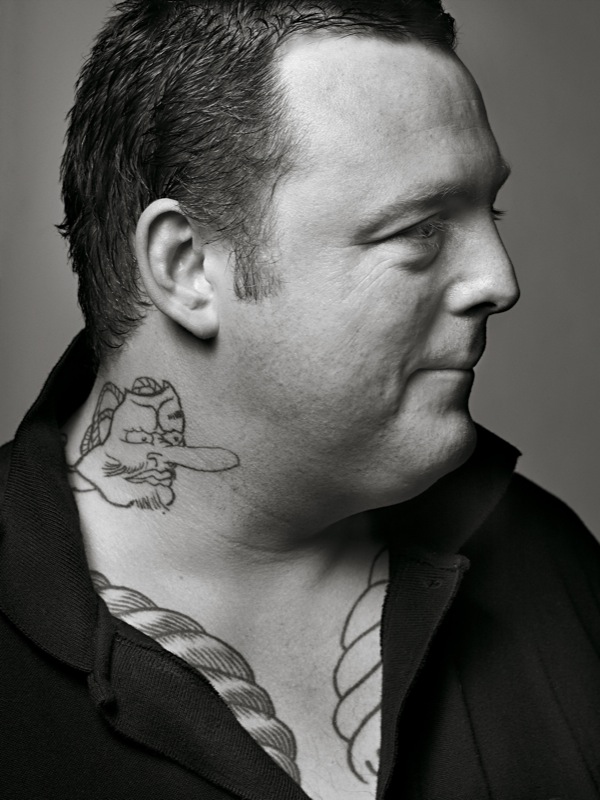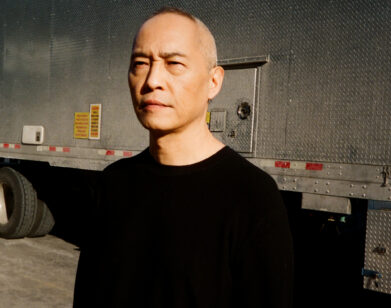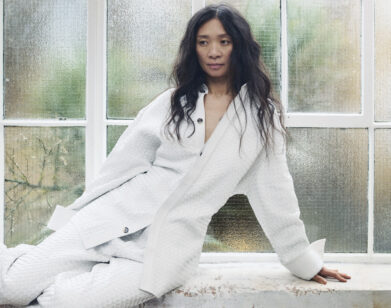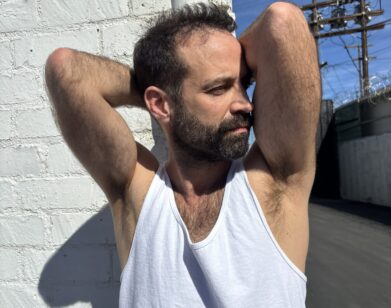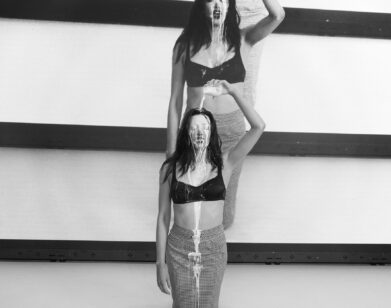Urs Fischer
In late 2007, Swiss-born artist Urs Fischer took a jackhammer to Gavin Brown’s pristine white West Village floors. A gallerist has got to have a lot of faith in an artist to let him rip through the concrete, upend pipes, and fill the space with a huge open trench of dirt and debris. Faith is precisely what Gavin Brown has in the 35-year-old Fischer, who lives and works in New York and Zurich. On the heels of Fischer’s extraordinary hole-in-the-floor show, gallerist and artist teamed up again to co-curate “Who’s Afraid of Jasper Johns?” at Tony Shafrazi’s gallery last May. The event was basically an experiment in outrage and orchestration, where the previous exhibition was minutely photographed and then turned into wallpaper to compete with a new set of paintings and sculptures. The project might sound convoluted, but Fischer’s work is overwhelmingly straightforward. He uses everyday materials like wax, fruit, dust, and chairs, and there is always a lingering feeling of loss and decay. Brown caught up with the artist just as he was preparing to build a new kitchen in his studio. Fischer clearly can’t stop tearing things up.
GAVIN BROWN: In our day-to-day activities there are a lot of things I don’t ask you.
URS FISCHER: Likewise.
GB: Like, I didn’t know until recently that you hadn’t gone to art school. That’s getting rarer these days. It actually makes me think that to be an artist, maybe you shouldn’t go to art school anymore.
UF: I think it’s about different generations. Many artists who don’t go off to art school come to New York. It’s about what you learn when you’re here.
GB: So where did you learn about art?
UF: I don’t know. Everywhere.
GB: Did you learn more, say, when you were 16 than you did when you were 26? Does what you learned apply better now?
UF: You basically only discover a new thing once. Actually, I’m only starting to learn about art art now.
GB: What’s art art?
UF: Art, like in the historical sense.
GB: Are you learning about that from books?
UF: Yeah. Sculpture from 2,000 or 3,000 years ago or more has similar concerns as it does now.
GB: Like what?
UF: Maybe an artist’s position in society is different today because it’s more individualistic. Maybe you’re not a direct servant anymore to the patron-you’re an indirect servant, or a servant with a choice, or maybe you could not even serve. That doesn’t matter. What I mean is, it’s the same. It’s the way you make something. Take a relief. You draw it, you carve it out. Later you build it up from a flat surface. There is no other way to do a sculpture-you either add or you subtract. There are only two choices, and it’s the same today.
If you don’t enjoy making work, then it’s bad… artwork is brutal for so many people… I like the idea of an artist as sombody who works.Urs Fischer
GB: You moved to New York from Zurich. Would you ever become a U.S. citizen?
UF: It doesn’t matter where you pay your taxes. It’s about being with other people. You’re still a citizen to this part of society.
GB: What was your typical day in Zurich at age 16?
UF: Drink coffee, go to school, drink more coffee, smoke cigarettes. We didn’t have cell phones, so you would meet people in the same café all the time. You go out, get dressed, you think about a lot of stuff-you’re very hazy at that age. You think you’re being totally clear, but you’re not.
GB: If you had to choose, would you be a punk or a surrealist?
UF: Neither.
GB: European or American? Do you still feel European here?
UF: I am European.
GB: Why are you living in New York?
UF: I tried living in other places. They’re too monocultural. It’s not like that here. I like a mix.
GB: A lot of people come here and just end up staying. You’ve been to a lot of places . . . but it seems as though you’ve made a decision to be here.
UF: I didn’t move here with aspirations. I didn’t come to New York and think, I’m really gonna make it . . . No. It was because of convenience. It’s a very convenient city to live in. I never wanted to move here when I was a teenager. Everybody I knew who was really ambitious and kind of annoying wanted to move here. I like it here but that has nothing to do with the fantasy image that goes along with it. You have so many people complaining, “It’s not how it used to be.” If you look for specific things and you don’t find them anymore, that’s disappointing. But that’s just your disappointment, it has nothing to do with the city. I think it’s a nice place-harsh at times, and so on, but beautiful nonetheless.
GB: Do you have fears?
UF: Yeah, sure.
GB: You’re one of the few artists I know who deals with your work in a very efficient way-fear doesn’t seem to come into the picture very much.
UF: I don’t know how it is for other people. Fear is a friend, no?
GB: Absolutely. Being alive is to be afraid.
UF: Yeah. You’re alive so you’re afraid. You’re alive so you live in fear. If you are asking me specifically about being an artist and running a studio, I feel as if I need money because I have to pay people. That’s a fear. But you don’t think about it. You realize if you have the money, it’s okay, you know? You can relax.
GB: Have you always bought other artists’ works? Or traded your own works for theirs?
UF: Sometimes, yes.
GB: Do you do it to support other artists, or do you actually want the work?
UF: I wouldn’t buy something only out of support. I love all this stuff. I like to live with it because it has different qualities. It’s interesting because you don’t know why certain things work. That’s why it’s nice when you live with it-you can look at it and a year later you still don’t know why it works.
GB: Do you get jealous of other artists?
UF: Not jealous. More envious. I like envy. I like that clarity.
GB: The sculptures you’re making now, no one’s seen-small blobs of clay, hand-manipulated and then digitally enlarged to enormous proportions–it’s an enormous leap from the hole in the gallery last year to these works.
UF: Yeah, but neither of them were compositions. I didn’t draw them or anything.
GB: What was the last thing you made that you touched? There were those dust paintings-
UF: There’s some stuff from the show last year that I touched. And this year I printed that fucking wallpaper with Tony [Shafrazi]. I touched every single piece of paper in that show.
GB: You’re building a kitchen in your studio?
UF: Yes, you need a kitchen. It’s nice to cook and eat or have people over to cook. I always like that.
GB: Are you going to have an open-door policy at your studio? Like, people can just drop by?
UF: Exactly. I like when people come by. It’s nice.
GB: You’re informed about a lot of different stuff. Where do you get the time? Do you read?
UF: I do read. Yes.
GB: Where do you find the time to watch all the movies you recommend to me?
UF: Well, you can watch four or five movies a day. You do it for a month and you’ve seen a lot of movies.
GB: But then all you’re doing is watching movies. Apart from movies, what are you most obsessive about?
UF: Art. I don’t always feel like this, but judging from my life, it must be.
You basically only discover a new thing once. Actually, I’m only starting to learn about art now.Urs Fischer
GB: You once said to me that you didn’t want to work a day in your life. I think that’s a fantastic ambition.
UF: As you know it’s not true, but whatever.
GB: But there are different ways of thinking about working. Do you think right now you’re not working?
UF: I don’t feel I’m working, except when I do office prep.
GB: Is being an artist an ideal form of existence?
UF: No, it’s really bad for human beings.
GB: To not work a day in their lives?
UF: It’s not that I don’t work. I work all the time. I think it’s bad for human beings to be artists. It’s awful. You want to do something but you’re constantly trying to decide what you want to do. Let’s just say it’s no place like Hawaii.
GB: Or Tahiti.
UF: Or Tahiti, exactly. If you don’t enjoy making work, then it’s bad. It’s rough. Artwork is brutal for so many people. They let it happen to them, but it’s brutal. I like the idea of an artist as somebody who works. A lot of the artists I like share this understanding. Like Bruce Nauman. He always seems to have an understanding of what he does. He does work.
GB: They say a really popular, well-attended exhibition at a gallery or museum still in the end has a tiny audience. Does that bother you?
UF: No. I don’t mind. Things can be local.
GB: Would you have liked to have been in Max’s Kansas City back in the day?
UF: No way. [laughs] The great thing was they all fit in one place. Maybe they had a good time, a safer time. Now we have all these other things, all these other places, and it’s okay. Maybe it’s more boring now, but I’m not sure if it’s necessarily worse.
GB: Are you going to sell your works directly to auction?
UF: No, but I do think that’s interesting. It’s not an idea that just landed from outer space: Why not work with an auction house rather than a dealer? Maybe the auction house actually takes better care of your shit? Maybe it makes sure your stuff is nicely photographed and looks good?
GB: Did the Hirst sale really break taboos?
UF: I think it was taboo-breaking for dealers. Did you find any artists complaining who don’t already complain all day long about everything? No. But have you ever met a dealer who thought it was okay? Well, you maybe. It’s still the art world. It’s meant to be extreme. It’s supposed to stand for liberty or whatever but really it’s an extremely conservative environment. Why does everyone wear jeans? Because it’s practical. To say something is taboo-breaking is to assume you have a clear image of the quality of a dealer. But there are certain dealers who always work this way. There is really no difference to how they work and how an auction house works. What I think is more interesting is that the dealer can be a mediator between the world and the artist, someone who inspires and helps someone to see something differently. The dealer creates something.
GB: Do you think about a piece you make being around in 200 years or 2,000 years?
UF: I could see the works just living in reproductions. The work lives on like fantasy. Some live even better as just an image.
GB: So what are you going to do in a year’s time, when it’s all melted down, every bank’s gone bust, and there are no more galleries or collectors?
UF: I think for art, it wouldn’t be bad, actually.
GB: Art presumably will go on?
UF: Art always goes on. It could use a makeover . . .
GB: A little clean out? A good colonic?
UF: There aren’t many spiritual values now in art.
GB: Do you ever worry about your footprint?
UF: Yeah. The whole art world is being filled with all these fairs and flying all that crap in crates all over the world in planes. Jesus.
GB: We’ve got a big footprint here, too.
UF: Then I think we’ve all got to become poets.

